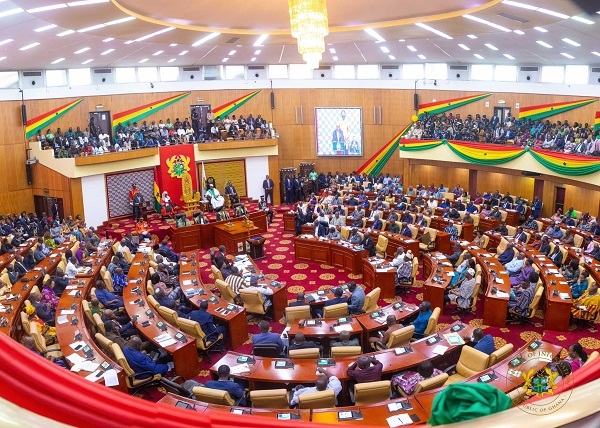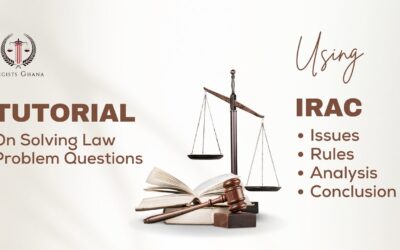
SETH DOE ESQ.
In Parliament today, the 22nd of October, the Speaker informed the House that on Thursday 17th of October, he had declared four (4) Parliamentary Seats vacant under Order 18 of the Standing Orders and applying Article 97(1)(g)(h) of the 1992 constitution of Ghana. The Speaker admitted that he had received a process from the Supreme Court, which is a ruling from the Supreme Court, under an Ex Parte application, directing Parliament to recognize and allow the 4 affected Members of Parliament to duly represent their constituents and conduct full scope of duties of their offices as Members of Parliament pending final determination of a suit filed by Hon. Alexander Afenyo Markin in the case of Alexander Afenyo Markin v The Speaker and Attorney-General. Writ No J1/01/2025.
The Speaker subsequently stated that under Articles 102 and 104 of the. Constitution, 1992, and Order 64(1) of the Standing Orders of Parliament, he notes that Parliament currently has a quorum to transact business but not to make decisions.
Article 102 of the 1992 constitution of Ghana provides that a quorum of Parliament, apart from the person presiding, shall be one-third of all the members of Parliament.
The heavy presence of Members of Parliament who are members of the National Democratic Congress on the majority side was to the Speaker enough evidence that the one-third quorum for Parliamentary Business has been fulfilled.
However, the MPs and members of the New Patriotic Party (NPP) staged a unified walkout before the Parliamentary Session began. This was in response to their agitation over the occupation of the majority side of Parliament by MPs of the NDC.
Therefore, upon a swift scan of the House, it was clear that less than half of all MPs were present in Parliament.
Article 104(1) of the Constitution provided that except as otherwise provided in this Constitution, matters in Parliament shall be determined by the votes of the majority of members present and voting, with at least half of all the members of Parliament present.
The Speaker reiterated that given the current circumstances, there is a question on the composition and constitution of Parliament, and having regard to the public interest and the exigencies of the state of affairs in Parliament, he would proceed to, in accordance with Standing Orders 59(1), adjourn the House indefinitely, ie, sine die.
Standing Orders 59 (1) provides that, “The Speaker may, in consultation with leadership, suspend a meeting of the House indefinitely or for a period determined by the Speaker, having regard to the public interest and the exigencies of the state of affairs in the country. “
As such the Speaker exercised his discretionary authority to suspend the House indefinitely and the House was accordingly adjourned.
This short legal commentary is to address the law on three matters:
- Whether the Speaker had acted in Contempt of the Orders of the Supreme Court?
- Whether the Speaker had acted in breach of his discretionary authority in suspending the House indefinitely despite urgent matters before the House less than two (2) months to the Elections?
- What are the possible measures to be taken by relevant parties in response to the declaration of suspension of the House sine die?
1.Whether the Speaker had acted in Contempt of the Orders of the Supreme Court?
Rt. Hon. Alban Kingsford Sumana Bagbin

The Speaker conveniently made no statement regarding whether the NDC members were rightfully occupying the majority side of Parliament in lieu of the Supreme Court order that the Speaker had admitted he had received. The effect of a formal admission of being served with the order of the Supreme Court meant that the Speaker was rightly notified of the Order. If the Speaker outrightly declared that he would not comply with the Order of the Supreme Court, that declaration might be a clear basis for contempt of the Supreme Court of Ghana.
In the Republic v High Court Accra; Ex Parte Laryea Mensah, [1998-99] SCGLR,360 the court unanimously held that one could not be punished in the absence of a wilful breach of order to do or refrain from doing some act. The court speaking through Bamford-Addo JSC pronounced on page 368 as follows:
“By definition, a person commits contempt and may be committed to prison for willfully disobeying an order of court requiring him to do any act other than the payment of money or to abstain from doing some act; and the order sought to be enforced should be unambiguous and must be clearly understood by the parties concerned. The reason is that a court will only punish as contempt, a wilful breach of a clear court order requiring obedience to its performance. Therefore, disobedience which is found not to be wilful cannot be punished.”
The Supreme Court in the case of Republic vs. SITO I Ex-parte Fordjour {2001 – 2002} SCGLR 322 stated the following as the essential elements when dealing with the offense of contempt:
- There must be a Judgement or order requiring the contemnor to do or abstain from doing something.
- It must be shown that the contemnor knows what precisely he is expected to do or abstain from doing and
- It must be shown that he failed to comply with the terms of the judgment or order and that the disobedience is wilful.
From the Speaker’s address to Parliament today and news reported in the media, it is clear that:
- The Speaker admitted to being served with a Copy of the Order of the Court.
- The Speaker made no statement that can be deemed to be a wilful refusal to comply with the Order of the Supreme Court.
- Dominic Ayine stated that the Speaker had instructed his lawyers to file processes to vacate the ruling of the Supreme Court.
- The Speaker deliberately did not address Parliament on the matter of compliance or otherwise of the Order of the Supreme Court.
Comparing the facts of the instant case to the principles of law enunciated in all the cases stated supra, it is apparent that the Speaker has pronounced a clear intention to legally challenge the Order of the Supreme Court and awaits ruling. Until that Order has been set aside, it can be argued that the Order is legally binding on the House of Parliament.
It is appreciated that in light of political tensions within the country and the circumstances surrounding the aftermath of the declaration of the four seats vacant, it was a politically astute and legally shrewd action by the Speaker not to formally address the House on his response to the Order but to initiate legal steps to set it aside once he disagreed with it. This is a credible act in respect of the special relations between the legislative and judicial arm of government which is that, though the judiciary cannot interfere with the internal affairs of Parliament based on the Separation of Powers, the judiciary has the authority of Judicial Review to declare an action of Parliament unconstitutional and to that effect null and void to the extent of the inconsistency.
In the celebrated case of Tuffuor v Attorney-General, (1980) GLR 637 the court appreciated two important principles governing the relationship that subsists or should exist between Parliament and the courts:
(a). That the courts can call in question a decision of Parliament; but that the courts cannot seek to extend their writs into what happens in Parliament; and
(b). That the law and customs of Parliament is a distinct body of law and, as constitutional experts do not put it, unknown to the courts.
Based on this reasoning, the court distanced itself from inquiring into how Parliament went about its business. These constituted the state of affairs, between the legislature and the judiciary which have been crystallized in articles 96, 97, 98, 99, 103, and 104 of the Constitution.
The rationale for the court’s holding that proceedings in Parliament are a closed book and cannot be subjected to judicial review is the concept of separation of powers and its necessary implication of non-justiciability of proceedings within Parliament.
Also in the case of Ghana Bar Association vs The Attorney General, [1995-96] 1 GLR 598, Edward Wiredu JSC stated that the scope and extent of the doctrine of the separation of powers was to ensure that each arm of state in the performance of its duties within the framework of the Constitution, 1992 is to act independently and should not be obstructed in the exercise of its legitimate duties or be unduly interfered with unless in accordance with the 1992 Constitution. In other words, all arms of the State are answerable or responsible to the Constitution, 1992.
- Whether the Speaker had acted in breach of his discretionary authority in suspending the House indefinitely despite urgent matters before the House less than two (2) months to Elections?
Article 102 provides for the quorum of Parliament and makes it clear that apart from the person presiding, there shall be one-third of all the members of Parliament. Article 104 provided for voting in Parliament to the effect that matters in Parliament shall be determined by the votes of the majority of members present and voting, with at least half of all the members of Parliament present.
Article 110 of the Constitution allows Parliament to regulate its procedure by Standing Orders.
Standing Orders 59 (1) provides that, “The Speaker may, in consultation with leadership, suspend a meeting of the House indefinitely or for a period determined by the Speaker, having regard to the public interest and the exigencies of the state of affairs in the country.”
In Kulendi JSC, the case of Justice Abdulai vs The Attorney General reflected on Articles 102 and 104 in the 1992 constitution. He stated;
“The rationale for having two separate quorum provisions is simple. The business of Parliament is diverse. Parliament is, first and foremost, a deliberative Chamber, where Members meet to debate and discuss various matters of public moment. For that deliberative function, when Members are not yet called upon to vote to decide or determine a matter (e.g., approve a proposed contract or a bill) but merely to discuss or debate it, the Constitution, per Article 102, sets a lower quorum threshold, that is, one-third of the full membership of Parliament-not counting any member (Deputy Speaker) who may be presiding at the time. However, where Parliament must exercise its legislative power to decide or determine a matter before it, the Constitution sets a higher quorum threshold, requiring, in that instance, at least half of all the members of Parliament to be present before a vote can be taken. In effect, the Framers of the Constitution placed voting in Parliament on a higher order of importance or magnitude than debating. Thus, while Parliament can commence business and proceed to debate a matter as long as at least one-third of its members are in attendance, it cannot proceed to decide on the matter (by vote) unless and until at least one-half of all members are present. The higher quorum threshold for voting, set at a minimum of half the membership of Parliament, is designed to ensure that decisions of the House, which carry legal or legislative consequences, are not taken unless at least half of the membership of Parliament is in attendance. It is designed, in effect, to prevent a minority of the members of Parliament from proceeding to decide a matter with binding legal effect.”
This is precisely applicable to the State of Parliament on 22nd October 2024. The Speaker appreciated that the House had the necessary quorum for deliberations in Parliament but not to vote. Based on his discretion, he decided to adjourn Parliamentary Sessions sine die.
Applying the doctrine of Separation of Powers and the principles enunciated in the cases of Tuffour v Attorney General (supra) and Ghana Bar Association vs Attorney General (supra), the court cannot interfere with a matter that falls within the discretion of the Speaker as the constitutional head of the legislative body.
In the brunt words of Archer C.J in the case of NPP vs Attorney General (31st December Case) [1993-1994] 2 GLR 35 SC “The Constitution gives the Judiciary power to interpret and enforce the Constitution and I do not think this independence enables the Supreme Court to do what it likes by undertaking incursions into territory reserved for Parliament and the Executive. This Court should not behave like an octopus stretching its eight tentacles here and there to grab jurisdiction not constitutionally meant for it”.
- What are the possible measures to be taken by relevant parties in response to the declaration of suspension of the House sine die?
It is reported in the news that the NPP caucus in Parliament is pursuing legal action against the discretionary suspension of sessions of Parliament sine die. Note that in the Ex-Parte Application for Stay of Execution of the Order of the Speaker, the Applicant and the Supreme Court noted that the execution of the Order declaring four seats vacant is likely to bring a halt to the business of Parliament in the dying minutes of the period to 2024.
Parliament is scheduled to go on recess from 5th November 2024 to enable MPs to focus on their campaign activities ahead of the December 7th Elections. It is appreciated that there are key Legislative Instruments at risk including:
- Confirmatory processes of 2 nominees for the Supreme Court.
- The Fees & Charges (Miscellaneous Provisions) (Amendment) Regulations, 2024
- Corporate Insolvency and Restructuring Regulations, 2024
- Prisons Service (Parole) Regulations, 2024
- Petroleum Downstream (Ghana Content and Participation) Regulations, 2024
A legal action before the Court to compel the Speaker to recall Parliament or nullify the decision to suspend Parliament sine die might not be appropriate.
Article 296(a) of the 1992 constitution provides that ‘’Where in this Constitution or any other law discretionary power is vested in any person or authority— a) that discretionary power shall be deemed to imply a duty to be fair and candid.”
It will be quite difficult to perceive the action of the Speaker as unfair when the Speaker has constitutional backing to adjourn the session of Parliament. As long as the Speaker took all matters seriously into consideration, the exercise of the discretionary power is fair. The reasoning of the Supreme Court in the case of Gregory Afoko vs The Attorney General [2019] GHASC 41 is that the party who claims a breach of discretionary authority by a person or body vested with that authority must properly make out a case of bias, unfairness, arbitrariness or capriciousness.
Per the surrounding facts of the matter, if the New Patriotic Party, NPP had remained in Parliament, the quorum for voting under Article 104 would have been fulfilled therefore making it unfair and capricious if the Speaker went ahead to adjourn proceedings sine die. The exit of the House by members of the NPP created a reasonable basis for the Speaker to postpone Parliamentary sessions indefinitely. The word “indefinitely” cannot connote “permanency” as Parliament can be recalled anytime. This procedure is provided by the constitution under Article 112 of the 1992 constitution; “Notwithstanding any other provision of this article, fifteen percent of members of Parliament may request a meeting of Parliament; and the Speaker shall, within seven days after the receipt of the request, summon Parliament.”
Hence MPs have a constitutional remedy of filing a petition or request to recall Parliament.
Order 38(1) of the Standing Orders of Parliament provides that the Speaker shall, under Article 112 of the 1992 Constitution, upon a request of fifteen (15) percent of the Members of Parliament summon a Meeting of Parliament within seven days after the receipt of the request, except that the meeting shall commence not later than seven days after the issue of the summons.
In conclusion, the declaration of adjournment of Parliamentary Sessions sine die is not in contempt of the Order of the Supreme Court and falls within the scope of discretionary authority of the Speaker of Parliament in respect of Article 104 and Standing Order 59(1). Aggrieved MPs should first resort to getting the requisite number of members for the formal filing of a request to recall Parliament pursuant to Article 112 of the 1992 Constitution.





